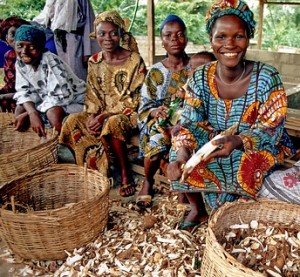Agriculture
Nigeria Leads West Africa in Organic Agriculture Promotion – ECOWAS Official

The Head of Agriculture Division, ECOWAS Commission, Abuja, Mr Ernest Aubee, has said that Nigeria was leading in the promotion of Organic Agriculture in the West Africa region.
Aubee said this in his closing remarks at the cocktail event on `Reporting Back Achievements of Ecological Organic Agriculture (EOA) Initiative’ activities in Nigeria for the years 2014-2020 and Award presentation, in Abuja.
He said Nigeria’s efforts in organic agriculture were commendable and timely, as it was coming at a time when people paid attention to what they eat.
“What Nigeria is doing will benefit not only Nigeria, as a country, but also the other 14 ECOWAS member states, and we hope member states will take a cue from your strides so far,” he said.
Aubee, also Chairman, Regional Steering Committee of EOA in West Africa, said EOA had been given a pride of place in the ECOWAS Commission, such that it was driving the organic agriculture initiative for the benefit of the region.
“We must look at how best to mainstream organic agriculture into every sector of the economy, to encourage and promote its sustainability in the region,” he said.
Aubee urged other ECOWAS member states to start work immediately on how best to ensure the mainstreaming of organic agriculture in their lives.
The event had in attendance representatives from the Ministries of Agriculture and Rural Development (FMARD), Trade, Industry and Investments.
Also present were the Agriculture Research Council of Nigeria (ARCN), Nigerian Export Promotion Council (NEPC), National Universities Commission (NUC), National Board for Technical Education (NBTE), NAFDAC and partners of the EOA Initiative in Nigeria.
Earlier, Dr Olugbenga AdeOluwa, the Nigeria Country Coordinator of EOA , reported that the Initiative had the support of the African Heads of States’ 2020 decision EX.CL/Dec.621 (XVII) on Organic Farming, and that Nigeria had been part of EOA processes since 2011.
Mr Oyewole Gbadamosi, the Project Manager, while reporting back on EOA’s achievements, said the goal was to mainstream EOA into national agricultural production systems by 2025, with a view to improving the quality of life of African citizens.
“A database of organic agriculture research on crop and livestock was produced and distributed in strategic institutional libraries in Nigeria; in bridging organic research gaps in the country.
“It also supported the production of the current revised version of Organic Agriculture Standards in Nigeria.
“The initiative has successfully supported one PhD degree programme, while the support of another one is ongoing.
“We also supported eight Masters studies and publication of seven research articles in an international journal.
“The curriculum for a full programme on Organic Agriculture Technology (OAT) in the Colleges of Agriculture has been produced.
”The material is ready to be subjected to pre-critic and national validation workshops, before absorption by the colleges, after approval by the National Board for Technical Education,” he said.
The Project Manager also noted that intensive sensitisation on the benefits of organic agriculture was being promoted by the Initiative.
“We have done a lot of intensive sensitisation on the benefits of organic agriculture with the production of a lot of information and educational materials on organic agriculture in English and different indigenous languages of the country.
”We have over 27 print publications addressing different aspects of organic agriculture.
“We have produced both print and video materials on organic livestock production (uploaded on YouTube https://youtu.be/EOrlsk4K0aE, https://youtu.be/F5IsrrbilH4 and https://youtu.be/0LX9GXhP7Qg) to increase organic livestock production in the country.
“We have equally produced audio visual jingles on the benefits of Organic Agriculture in four languages; English, Yoruba, Igbo and Hausa, to sensitise consumers in the country,” he said.
Gbadamosi said that the capacity of over 450 stakeholders was strengthened, to undertake inspection under the Participatory Guarantee System of certification and general organic agricultural issues.
“250 extension officers in the 36 states and Abuja were trained on the Basics of Organic Agriculture, Concept of Innovation Platforms and how it operates and the operationalisation of organic agriculture innovation platforms for driving organic agriculture markets in Nigeria.
“We supported the production of the first draft of the “Organic Agriculture Standards in West Africa”. This material has been submitted to the West African regional Secretariat for further inputs.
“We established an Agriculture Business Summit, an annual exhibition of organic agriculture produce, products and services in Nigeria since 2016.
” We have also begun OrganiCulture, a journal of organic agriculture business, for the promotion of organic agriculture business development in the country and national award on organic agriculture”, he added
Highlights of the event included the 2020 National Organic Agriculture Business Summit award presentation to Mrs Ebere Agozie, of the News Agency of Nigeria (NAN), as the Organic Advocacy and Media Personality of 2020.
Other award recipients were Mrs Udeme Udoya of Ikot Ekpene Women Food Cash Crops Multipurpose Cooperative Society, as the Organic Farmer Processor of the year, and Akwa Ibom State, as the Organic State Government of the year. (NAN)
Agriculture
Olam Agri Partners with SCAAD to Empower Women in Benue, Nasarawa

From Attah Ede, Makurdi
Olam Agri, in partnership with Sustainable Collective Advocacy for Africa Development (SCAAD) Initiative, is to launch the Community Resilience Opportunities for Women and Youth (CROWY) in Benue and Nasarawa States.
A press release by Elizabeth Nnoko Communication Manager, Olam Agri, said the CROWY Project is aimed at creating lasting positive change for women and youth across Nigeria’s North-Central region.
The Project ground-breaking initiative is designed to empower grassroots women and youth farmers, aligning with national development and gender equality objectives.
The project also, aims to strengthen livelihoods during off-farming seasons by equipping beneficiaries with strategic leadership skills, entrepreneurship training, and increased awareness on inclusion, gender equality, and early warning signs and systems related to Gender-Based Violence (GBV).
Delivered in collaboration with Rich-Oak Life Initiative, Sahel International Support Foundation, and Elikizi Foundation for Women and Youth Advancement, the CROWY Project seeks to close critical economic gaps by providing inclusive livelihood opportunities, access to cooperative financing, and leadership support for emerging women and youth-led enterprises.
“We aim to create 10 Village Savings and Loan Associations and support 100 of women and youth entrepreneurs within the first year in the fields of tailoring, baking amongst others.
“This intervention will expand economic opportunities, promote self-employment, and build sustainable and resilient livelihoods across the targeted communities.
“Across Nigeria, women, youth, and persons with disabilities continue to face systemic barriers to education, livelihoods, and leadership pathways. Recent statistics highlight the urgency of this challenge.
“In 2023, women’s labour force participation stood at just over 52%, down from nearly 57% in 2010 (Statista, 2023). Youth unemployment remains critically high, with 53% of Nigerians aged 15–24 unemployed or underemployed (World Bank, 2024).
“According to Nigeria’s Minister of Women Affairs, as of October 2025, approximately 70% of Nigerian women live in extreme poverty, unable to meet basic needs or sustain livelihoods
“These figures paint a stark picture of structural inequalities that continue to undermine national development and social stability”, the statement said.
On the part of SCAAD initiative, a Statement by Frances Okeke, Executive Director, stated that “Every day, we meet women and young people with immense creativity and resilience, yet without the support they need to thrive truly. Nigeria’s overlapping crises have made survival even harder for them, especially in farming communities where off-season periods often deepen economic vulnerability.
Okeke maintained the through the support of Olam Agri, the CROWY Project is stepping into this gap, offering practical skills, livelihood opportunities, and hope to grassroots women and youth.
Said he, “Together, we are equipping individuals not only to earn a living during non-farming seasons but also to lead, innovate, and uplift their communities. When women and young people are given the tools to succeed, entire communities become more resilient and rise with them.”
While Anil Nair, Country Head Olam Agri Nigeria added, “Our partnership with SCAAD Initiative on the CROWY Project reinforces our shared vision of resilient, empowered, and economically active communities. Women and youth are central to the future of agriculture in Nigeria and supporting them through targeted skills development and inclusive financing is essential for long-term national growth.
“Olam Agri will continue to champion initiatives that uplift vulnerable groups and strengthen the fabric of our communities.”
“Olam Agri and SCAAD Initiative invite government agencies, community leaders, NGOs, and development partners to join in supporting inclusive livelihood strategies. Collaboration is vital to building resilient, equitable communities.
“The partnership is committed catalyze efforts to enhance economic opportunities, promote self-employment, and build sustainable livelihoods for women and youth in conflict-affected communities”.
Agriculture
FG Tasks Africans on Sheep, Goat Plague Eradication

The Federal Government said African countries must shift from reactive, event-driven responses to predictive, risk-based and analytics-driven surveillance to meet the global target of Peste des Petits Ruminants (PPR) disease eradication by 2030.
PPR is a viral disease caused by morbillivirus closely related to rinderpest virus which affects goats, sheep and wild relatives of domesticated small ruminants and camels.
Permanent Secretary, Federal Ministry of Livestock Development, Dr.
Chinyere Akujobi said this in Abuja on Wednesday at the Regional Training on Strengthening Animal Disease Surveillance, Building Capacities for PPR Eradication and Trans-boundary Animal Diseases.The training was under the Framework of Implementation of the Pan-African PPR Eradication and other Sheep and Goat Disease Control Programme in West African Member Countries.
It was organised by the Food and Agriculture Organisation of the United Nations (FAO) in collaboration with the African Union-Interafrican Bureau for Animal Resources (AU-IBAR) with financial support from the European Union.
Akujobi urged every country to build surveillance systems that were smarter, faster and more collaborative.
She further urged strengthening coordination, adoption of modern tools and ensuring information-driven action.
“We must build stronger technical skills in participatory and risk-based surveillance; harmonise epidemiological procedures so that data generated across countries can be compared and acted upon.
“We must adopt modern tools for defining epi-systems, map high-risk zones and integrate these results into continental and global platforms and strengthen regional coordination structures and the Regional Veterinary Committee.
“These priorities speak directly to the core challenges of our region, uneven reporting, weak linkages between laboratories and field surveillance, fragmented information systems and gaps in cross-border coordination,” she said.
She said the presence of participants at the workshop demonstrated the collective commitment of the region in tackling diseases that continued to undermine livestock productivity, livelihoods and regional integration.
Akujobi urged the participants to approach the sessions with an evidence-driven mindset that reflected the complexity of today’s trans-boundary animal disease landscape.
“Our surveillance systems must be guided by real-time information and must incorporate digital tools that enable us to detect risks early and intervene quickly.
“At the same time, our countries must work in harmony, because a disease like PPR does not recognise administrative boundaries.
“It is essential that our systems speak to one another and that information flows seamlessly from community animal health workers to national databases and onward to regional and global systems.
“This gathering is more than a routine training session; it represents a strategic turning point for West Africa,” she said.
According to her, many African countries remain heavily affected by PPR, Foot and Mouth Disease, African Swine Fever, Anthrax, Highly Pathogenic Avien Influenza (HPAI) among other trans-boundary and zoonotic diseases that threaten food security.
“The small ruminant sector, in particular, supports millions of families, including women and youth whose livelihoods depend on healthy animals.
“Every outbreak that sweeps through our communities deepens vulnerability and disrupts social and economic stability,” she said.
She assured that Nigeria remained fully committed to regional solidarity and to the Pan-African PPR Eradication Programme.
Akujobi said the country was focused on strengthening the National Animal Disease Information System to improve reporting from across the federation, enhanced laboratory–field collaboration under the One Health approach.
According to her, Nigeria works closely with ECOWAS, AU-IBAR, FAO and World Organisation for Animal Health to align national actions with continental strategies.
The training targeted veterinarians, laboratory scientists, epidemiologists, wildlife experts, border authorities and pastoralist communities across West Africa.
Its goal was to strengthen national and regional systems to enable them to be better equipped to eradicate PPR.
Agriculture
FG Empowers 9,870 Farmers with Inputs, Modern Rice Technologies in Kano

The Federal Government, through the Kano State Special Agro-Processing Zone (SAPZ) Programme in partnership with IFAD, has empowered 9,870 rice farmers in Kano with climate-resilient inputs and modern rice production technologies.
This was contained in a statement issued by the SAPZ Knowledge Management and Communication Officer, Rabi Mustapha.
The State Project Coordinator, Aminu Iliyasu, disclosed this on Sunday during the Farmers Field Day at Chiromawa Garin Babba Cluster in Garun Malam Local Government Area.
He said the exercise was organised to expose the farmers to Science-based and practical solutions capable of enhancing yields, improving food security, and boosting rural livelihoods.
Iliyasu described the field day as a celebration of knowledge, innovation and the resilience of smallholder farmers.
He explained that the SAPZ initiative in Kano aimed to expand access to improved technologies, strengthen extension services, reduce post-harvest losses and create market opportunities for rural farmers.
“These innovations are not theoretical. They are practical solutions that farmers can adopt immediately to raise productivity and increase income,” he said, while commending the support of local authorities.
Mustapha said the inputs distributed to 9,870 farmers included FARO 44 improved seeds, Urea and NPK fertilizers, and insecticides, targeting beneficiaries in Garun Malam, Gezawa, Bichi and Bagwai LGAs during the 2025 wet season.
She added that experts trained farmers on soil selection, seed dressing, nursery establishment, land preparation, and timely transplanting at proper spacing.
“They also covered fertilizer management, weed control, Integrated Pest Management and water regulation to boost rice yields.
“The training emphasised harvesting at optimal maturity, drying paddy to safe moisture levels, and fumigation using phostoxin to prevent storage losses,” she stated.
A beneficiary, Salamatu Ali, said the intervention had positioned Kano farmers to boost yields, withstand climate pressures and increase household incomes.
Another farmer, Huwaila Ibrahim, said the programme transformed her approach to rice production.
“Before, we planted without checking whether the land was suitable.
“Now, we first assess the soil to ensure it matches the seed variety. This season, we cultivated FARO 44,” she said.
Ibrahim added that her output increased from 20–25 bags per acre to about 40 bags after adopting the improved technologies.





























